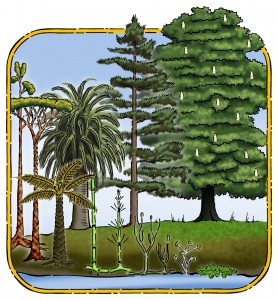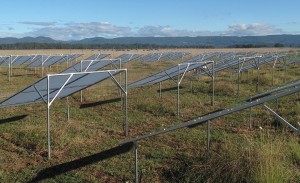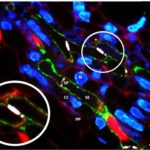- About
- Members
- Join
- Member log in
- Membership Renewal
- Member directory
- Life Members
- ASPS Life Member Professor Graham Farquhar
- ASPS Life Member Associate Professor Hendrik (Hank) Greenway
- ASPS Life Member Dr Marshall (Hal) D Hatch
- ASPS Life Member Dr Paul E Kriedmann
- ASPS Life Member Dr Mervyn Ludlow
- ASPS Life Member Emeritus Professor Rana Munns
- ASPS Life Member Conjoint Professor Christina E Offler
- ASPS Life Member Professor (Charles) Barry Osmond
- ASPS Life Member Emeritus Professor John W Patrick
- ASPS Life Member Dr Joe Wiskich
- Corresponding Members
- Elected Fellows
- Events
- Awards & Funding
- Employment
- Publications
- Research
- Teaching
- Menu
38th New Phytologist Symposium: Colonization of the terrestrial environment 2016
20 January 2016
38th New Phytologist Symposium:
Colonization of the terrestrial environment 2016
25-27 July 2016, Bristol, UK
Travel grant submission deadline: Thursday 21st April 2016
Poster abstract submission deadline: Thursday 19th May 2016
The purpose of this symposium is to explore the contribution that plants and mycorrhizal fungi made to the colonization of the terrestrial environment. Building on the success of the 25th New Phytologist Symposium, the focus will be on exploring current uncertainties in four major themes:
1) Interrelationships;
2) Anatomy – developmental genetics;
3) Refining biogeochemical models to take account of the role of plants and fungi; and
4) Anatomy and physiology of early land plants – what can we learn from extant species?
The meeting will take place over three days in Bristol, UK. There will be a number of invited and selected talks (chosen from submitted poster abstracts). There will also be dedicated time for a poster session and conference dinner.
Keynote speakers:
Liam Dolan, University of Oxford, UK; Ned Friedman, Harvard University, USA; Tim Lenton, University of Exeter, UK
37th New Phytologist Symposium: Plant developmental evolution
20 January 2016
37th New Phytologist Symposium:
Plant developmental evolution
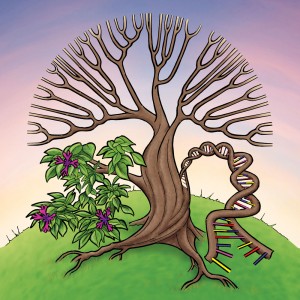
Beijing, China
Travel grant submission deadline: Thursday 25th February 2016
Poster abstract submission deadline: Thursday 17th March 2016
The relatively new field of plant evolutionary-developmental biology (‘evo-devo’) seeks to understand how and why plant morphological characters have evolved to produce the tremendous diversity of form in living plants. This meeting will draw together researchers in plant evo-devo for exchange of ideas, current research, and discussion of future directions for the field.
Sessions:
floral development; vegetative meristems, leaves, and inflorescences; plasticity and life history evo-devo; selected poster abstract talks.
Eighteen leading scientists will speak at the Symposium. We hope that this will stimulate focused discussion and the exchange of ideas at what will be a relatively small (around 120 delegates) and informal meeting. There will be a poster session, selected talks, discussion and a conference dinner.
Keynote speakers:
Beverley Glover, University of Cambridge, UK; Mark Rausher Duke University, USA; Miltos Tsiantis, Max Planck Institute for Plant Breeding Research, Germany.
Ninth Australian Conference on Grassland Invertebrate Ecology
15 January 2016
Ninth Australian Conference on Grassland Invertebrate Ecology
4-7 April 2016, Western Sydney University, Australia
The conference focuses on the biology, ecology and management of both pest and beneficial invertebrates in native and introduced grasslands including pastures, pasture/crop rotations and turf.
The Conference (grassbugs.com.au) will be hosted by the Hawkesbury Institute for the Environment at the historic Hawkesbury campus of Western Sydney University. The campus is nestled at the foot of the Blue Mountains and has been a hub of agricultural research and training since 1891. Grassland research, in particular, has featured prominently at the site with modern Australian grasses first used and developed on the Hawkesbury campus in the 1920s. The Conference will be held over three days including a half day field trip to the Royal Botanic Gardens in the Blue Mountains.
Report of Education Sessions at ComBio 2015
10 January 2016
Adapted from an article published in the December 2015 issue of the ASBMB magazine, the “Australian Biochemist”, by Gonzalo Estavillo and Janet Macaulay.
High profile educators, science communicators and academics passionate about teaching participated in the two education focused sessions held at ComBio2015, organized by ASPS and ASBMB. The main themes were ‘Challenges in Research Training’ for the lunch workshop and ‘Innovations in Undergraduate Education’ for the concurrent symposia, both on Tuesday 29 September.
Both sessions were well attended by more than 50 people in each providing a good opportunity for both audience and speakers to exchange their thoughts and practices about university science education. The sessions were coordinated by the Education Representatives from the ASBMB and ASPS, Associate Professor Janet Macaulay (Monash University) and Dr Gonzalo Estavillo (CSIRO Agriculture), respectively.
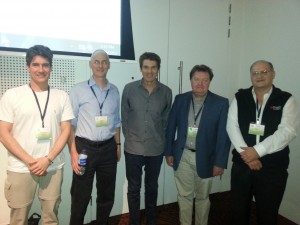
Education Session I, from left: Gonzalo M Estavillo (co-Chair), Martin Stone, Graham Phillips, Alastair McEwan and Terrence Piva (co-Chair).
Associate Professor Martin Stone (Director of the MBio Graduate School, Monash University) kick-started Education I: ‘Challenges in Research Training’ session discussing efforts on how to map skills training onto target competencies for graduate students. Five main core competencies for PhD students were identified, including subject area knowledge, technical expertise, critical thinking, communication skills and professionalism. This program has implemented a ‘competencies assessment rubric’ to help students and supervisors assess their progress. Martin highlighted the need for developing a sense of professionalism, defined as self-respect, organisation skills, and ability to prioritise work, as well as being a team player. Finally, Martin identified time, resources and reaching a consensus on what and how to teach as still being the main challenges in graduate education.
The second talk of the session was presented by the Dean of the UQ Graduate School, Professor Alastair McEwan. Alastair described a framework identifying transferable skills for employability of PhD graduates. Alastair highlighted that undertaking a PhD “is not a waste of time and that the skills that can be gained” can be used in other profession employment positions. Interestingly, Alastair discussed that the most successful economies of Scandinavia have three to five times more researchers in business enterprise compared to Australia, which is remarkable given that both countries have about the same number of researchers. The challenge learnt is to insure that the skills learnt can be transferred during the PhD directly into the job market. Although the professional skills are relatively easy to acquire and measure during the PhD, transferable skills, that is, skills applicable to other jobs, are not so easy to track. Although transferable skills could be taught during boutique workshops and professional development courses (such as VITAE) and industry placements, they are much harder to assess. Placement or short stays in other organisations could be a good way to assess transferable skills.
Finally, Dr Graham Phillips gave an informative talk about his experiences as a science communicator and why he chose science communication as a career path. Graham is a well-known science communicator from the ABC’s Catalyst with a PhD in astrophysics. He also teaches an introductory science communication course co-convened with Associate Professor Ros Gleadow at Monash University. Graham argued that people in most jobs, including scientists, “need good communication skills… and need to have proof of it”. Moreover, he pointed out that “we want to hear more scientific points of view in the media”, highlighting climate change as an example where the participation of more scientists would greatly benefit the debate. “Know your audience and present the big picture story” was his advice to people keen on science communication to a non-specialised audience. Extra time in the Education I session allowed for a very interesting Q&A session between panellists and the audience, which completed this highly educational symposium.
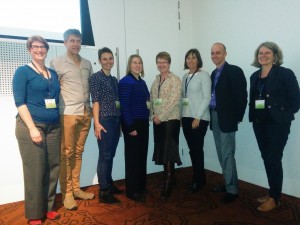
Education Session II, from left: Heather Verkade (co-Chair), Peter Arthur, Beth Loveys, Karina Riggs, Susan Rowland, Ros Gleadow, Patrick Schaeffer and Janet Macaulay (co-Chair)
Education II: ‘Innovations in Undergraduate Education’ started with a presentation by Dr Peter Arthur, winner of the 2015 ASBMB Beckman Coulter Education Award. Peter discussed a process which had been introduced at UWA to measure the effectiveness of achievement of teaching goals within lab classes. This system allows review of assessments to ensure alignment of assessment and instruction. Peter was followed by Associate Professor Ros Gleadow who spoke about harnessing digital tools to improve undergraduate teaching. Ros has redesigned the landing screen and general format of the Moodle site to a more student friendly and engaging format which is more interactive, enabling greater student collaboration. She uses social media tools such as Twitter and Facebook to closely engage with the students.
The next presentation was a team presentation by Dr Beth Loveys and Dr Karina Riggs who discussed flipping laboratory classes. Their model of a flipped class enables the incorporation of learning activities covering the range of Blooms taxonomy – pre-class: remember and understand; during class: apply and analyse; and post-class: evaluate and create. They use online pre-practical activities to ‘flip the laboratory’ with agriculture and viticulture science students. They also argued that students gained broader knowledge, better understanding and gained greater confidence after those pre-practical activities. Importantly, students’ marks significantly increased after their new approach. Dr Patrick Schaeffer then discussed a successful approach taken in a biotechnology course to prepare students for real world challenges. The molecular biology course integrates experimental design, critical and analytical thinking and laboratory work in real-world situations. Associate Professor Susan Rowland discussed the struggles and issues associated with undergraduate research. This presentation discussed the scale of student experiences from standard practical classes to ALURE (Authentic Large-scale Undergraduate Research Experience) to URE (Undergraduate research experience). Susan talked about the ALURE project and the issue of what is authentic research. Collectively all these speakers delivered highly insightful presentations which opened up deeper thought on how we can all be more effective in our communication delivery and better approach the road to educational discovery.
Report from Dr Samantha Grover, Plant Nutrition Trust Award recipient 2015
08 January 2016
5th International Symposium on Soil Organic Matter, Göttingen, Germany, September 20-25th
A whole week of soil organic matter! While many Europeans commented that it was a long way to come for a conference, the nine Australians lucky enough to attend SOM2015 all agreed that we found it thoroughly worthwhile. On the pre-conference field trip, Brian Wilson, Samantha Grover and a dozen other scientists visited peatlands under a range of agricultural uses and had fun flitting back and forth across the former border between East and West Germany. Schnapps tasting at a former convent ended the day but set the scene for the conference proper, which featured different local beers during the poster sessions every evening. Lynne Macdonald, Mark Farrell, Gaelle Ng, Tom Baker, BP Singh, Bhawana Bhatta and Jessica Ernakovich joined Brian Wilson and Samantha Grover to present a wide range of the SOM research from Australia. Outputs from the National Soil Carbon Program were abundant. The Australian contingent joined delegates from more than 50 countries, who presented 161 talks over four days, selected from more than 600 submitted abstracts. The bar was set high, with opening keynote addresses from Rattan Lal and Johan Six. All agreed that this high standard was maintained and the coffee (and beer) breaks were abuzz with animated conversation. Dr Grover’s talk on the effects of lime on the mineralisation of soil organic matter attracted considerable interest and connections were established with two authorities in this area. Ongoing research on peat soils was also strengthened by the first face-to-face meeting between Samantha Grover and Anna Normand, a PhD student from the University of Florida whom Dr Grover co-supervises. The next conference baton was passed on to Jennifer Dungait from Rothamstead Research, which will host the 6th SOM symposium in 2017. A post-conference workshop on SOM fractionation will result in a comparative trial of fractionation methods from laboratories around the world, with Lynne Macdonald accepting the trial soils to contribute CSIRO’s methodology to the study.
After the conference Samantha visited Dr Cordula Vogel and Professor Karsten Kalbitz at Dresden Technical University and gave a splendid talk to their Soil Science and Site Ecology group. Potential collaborations were discussed, a joint project proposal drafted and relationships between the two groups were even further strengthened. The valuable contribution from the Plant Nutrition Trust was well acknowledged in all presentations and it helped to attract matching funding from La Trobe University.
Samantha Grover and Brian Wilson with colleagues at a remnant of the fence dividing East and West Germany on the SOM2015 pre-conference field trip.
GPC Dec e-bulletin, the 4th International Conference on Plant Vascular Biology and new job opportunities.
07 January 2016
Your current membership is [wpmlfield name=”membershiptype”] which is paid until [wpmlfield name=”paidtodate”] (year, month, day).
The 4th International Conference on Plant Vascular Biology will be held in Shenzhen, China between July 19th and 23rd 2016. Early registration is due April 1.
For further details go to 4th International Conference on Plant Vascular Biology or PVB2016 flyer
There are also more employment opportunities available through the ASPS website at UWA, Perth and 4 positions at ANU Acton.
|
|||||||||||||||||||||||||||||||||||||
|
|||||||||||||||||||||||||||||||||||||
|
|||||||||||||||||||||||||||||||||||||
|
Recent Posts
Tags
Archives
- June 2025
- May 2025
- April 2025
- March 2025
- February 2025
- January 2025
- December 2024
- November 2024
- October 2024
- September 2024
- August 2024
- July 2024
- June 2024
- May 2024
- April 2024
- February 2024
- January 2024
- November 2023
- October 2023
- September 2023
- August 2023
- July 2023
- June 2023
- May 2023
- April 2023
- March 2023
- February 2023
- December 2022
- November 2022
- October 2022
- September 2022
- August 2022
- July 2022
- June 2022
- May 2022
- April 2022
- March 2022
- February 2022
- January 2022
- December 2021
- November 2021
- October 2021
- September 2021
- August 2021
- July 2021
- June 2021
- April 2021
- March 2021
- February 2021
- January 2021
- December 2020
- November 2020
- October 2020
- September 2020
- August 2020
- July 2020
- June 2020
- May 2020
- April 2020
- March 2020
- February 2020
- January 2020
- December 2019
- November 2019
- October 2019
- September 2019
- August 2019
- July 2019
- June 2019
- May 2019
- April 2019
- March 2019
- February 2019
- January 2019
- December 2018
- November 2018
- October 2018
- September 2018
- August 2018
- July 2018
- June 2018
- May 2018
- April 2018
- March 2018
- February 2018
- January 2018
- December 2017
- November 2017
- October 2017
- September 2017
- August 2017
- July 2017
- June 2017
- May 2017
- April 2017
- March 2017
- February 2017
- January 2017
- December 2016
- November 2016
- October 2016
- September 2016
- August 2016
- July 2016
- June 2016
- May 2016
- April 2016
- March 2016
- February 2016
- January 2016
- December 2015
- November 2015
- October 2015
- September 2015
- August 2015
- July 2015
- June 2015
- May 2015
- April 2015
- March 2015
- February 2015
- January 2015
- December 2014
- November 2014
- October 2014
- September 2014
- August 2014
- July 2014
- June 2014
Copyright 2017 Australian Society of Plant Scientists Disclaimer & Privacy
Website by Michael Major Media

